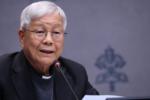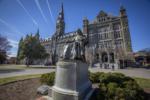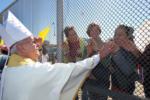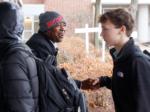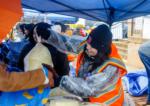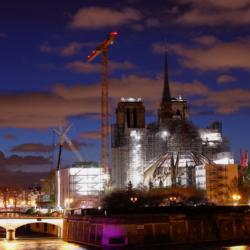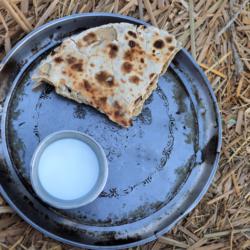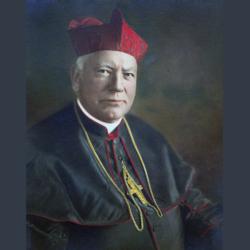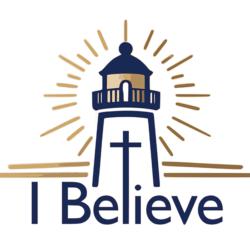Six future priests for Boston ordained transitional deacons
BOSTON -- Deacon Brian Daley was looking for "a more stable life."
After spending six years as an engineer in the Merchant Marine, working in far-flung locales like South Korea, Taiwan, and Singapore, he was ready to go back to the U.S., get a less itinerant job, and start a family.
"It was very difficult to make the next step," Deacon Daley, a seminarian at St. John's Seminary in Brighton, told The Pilot, "because I realized that I needed faith to do that."
He needed spiritual direction. He began exploring his faith more deeply by attending Mass regularly and having conversations with a friend who challenged his previously held beliefs.
"One thing led to another," he said. "It's like, if God really loves me, and he wants me for himself, what does that mean for me? And so that's when I entered seminary."
Deacon Daley was one of six men ordained as transitional deacons in a Mass celebrated by Cardinal Seán P. O'Malley at the Cathedral of the Holy Cross in Boston on May 4. Deacon Daley, Deacon Peter Dong Huy Pham, and Deacon Joseph Thuy Nguyen were ordained from St. John's Seminary; Deacon Vincenzo Caruso and Deacon Mateus Oliveira Martin were ordained from Redemptoris Mater Seminary in Chestnut Hill; and Deacon Brian Delaney was ordained from Pope St. John XXIII National Seminary in Weston.
After spending one year in the diaconate, the six men will be ordained to the priesthood, but in his homily, Cardinal O'Malley warned them not to rush through their time as deacons.
"Although we are using the term 'transitional deacon,' your call to the diaconate's humble service and ministry of mercy is not just a preface to your priestly ordination," the cardinal said, "but will be an enduring characteristic of your ministry as priests in the future."
Cardinal O'Malley began his homily by noting that the first class of deacons ordained by the Apostles spoke Hebrew and Greek, fewer languages than were being spoken by the assembly in the cathedral that day. He thanked those who formed and prepared the seminarians, especially their families. Describing the role of a deacon, he compared it to the novel and film "The Remains of the Day," which tell the story of a butler who makes many sacrifices and endures many disappointments in his personal life out of fidelity to his master.
"When Jesus describes himself as a servant, that is what he is talking about," the cardinal said. "Today, these men will be ordained servants, which is the English translation of the word deacon."
He noted that the prophet Isaiah described Jesus as "the suffering servant."
"Jesus is our master," the cardinal said, "but he came to serve, not to be served, as he says. The diaconate is a magnificent expression of Christ's service."
He explained that the first responsibilities of the deacons were to wait on tables and care for widows and orphans, but their role soon grew to preaching the Gospel and serving as spiritual leaders.
"To be a servant requires great strength and loyalty," he said. "You all have to remind yourselves often, 'It's not about me, it's about Christ.' It's not always a glamorous job. Sometimes, it's a supporting role. Sometimes, we cannot see the fruit of our efforts. To be a servant of Christ the suffering servant is a privilege. It requires great faith to appreciate just how sublime this vocation is."
Cardinal O'Malley told the deacons that they must spread the Gospel and live it joyfully. They must derive meaning from the Scriptures, but their study of the Bible must not be so "academic" that they forget to serve the poor, sick, lonely, and suffering as the Gospel commands them. Like Christ when he wept at the tomb of Lazarus, the cardinal said, deacons must always be present to show compassion to whoever needs it, without rejection or judgment.
"If we learn to pray using the Scriptures, then God's words will ever be in our arms and on our lips," he said. "We must pray the Word of God to be able to preach it."
He said that in a world that is divided among racial, national, political, and generational lines, the purpose of a deacon is to evangelize and unify.
"The work of the deacon is to be a healer and a reconciler," he said, "a builder of community and solidarity amidst all of our differences. The whole church is grateful for your generous response to God's call."
Prior to his homily, the six candidates for the diaconate were presented to Cardinal O'Malley, who elected them for ordination. The assembly applauded as a sign of approval that the men be ordained deacons. After Cardinal O'Malley's homily, the candidates pledged that they would faithfully execute the office of deacon and be obedient to God, as well as to Cardinal O'Malley and his successors. The candidates lay prostrate before the cathedral altar, representing their humility and service to God, as the assembly prayed the Litany of Supplication.
"It was a very beautiful experience," Deacon Daley told The Pilot after Mass. "It's overwhelming to understand that the whole faithful was praying for you in that moment. And to hear it sung as you're prostrate before God, it's very clear, the undertaking."
"It didn't hit me until I was up on that altar," Deacon Delaney told The Pilot after Mass. "And as we were going through the Mass, the celebration, it just all confirmed to me that this was the work of the Holy Spirit."
After the Litany of Supplication, Cardinal O'Malley laid his hands on each candidate, continuing the unbroken line of succession dating back to the Apostles, and prayed the Prayer of Ordination. The newly-ordained deacons received the dalmatic and stoles of the diaconate, then laid their hands on a Book of the Gospels held by Cardinal O'Malley. The cardinal told them to believe, preach, and practice the Gospel. After that, they received the Kiss of Peace from Cardinal O'Malley and their fellow deacons.
After Mass, Deacon Delaney told The Pilot that it feels "absolutely amazing" to be one step closer to the priesthood.
"I can't believe three years has gone by so fast," he said. "And I'm so looking forward to next year."
He felt called to the priesthood for many years, and spent much of his life involved in different church ministries.
"I just really enjoyed it," he said, "and the more I got involved, the more I wanted to do, so at some point in time, the good Lord finally caught me at 60 years old and said, 'It's time.'"




